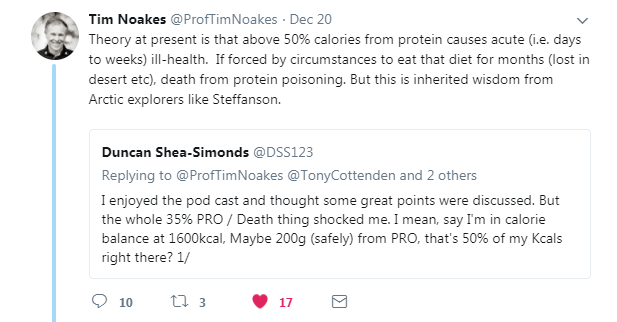To my non-sciency brain this article makes a lot of sense and seems to be based on reasonably reliable sources. What are your thoughts?
Protein will not make you fat, article
Hi MelTar, this is a great article Protein Raising Glucose that is very comprehensive regarding what “too much” protein will do to you. Great read, if rather long. First time it’s made total sense to me.
I’ve read the article you linked to before. It’s well written and easy to understand. The two articles are focusing on different issues though. One is about the effects of dietary proten on body fat gain vs lean mass gain, the other is about the effects of dietary protein on gluconeogenesis.
Oh yes, I’m starting to see that there are many factors affecting body weight and composition. I guess what I liked about the article is it was a clever way to isolate the factor of dietary protein only on body fat gain and lean mass gain.
You can indeed @April. Great minds think alike. It’s the same one I was linking to that appeared on another thread. 
Interesting read. I don’t follow the keto macros. Most days my macros are 60% fat 35% protein, 5% carbs. I am big on weight lifting but I stay in ketosis most of the time and have lost a lot of fat
“Without this steady supply of amino acids, the body resorts to breaking down its own proteins – typically from muscle – in order to meet this demand.”
Early on, they insert this, and I have to disagree with it - no, it’s not typically from muscle. If and when somebody gets to that state, they are far down the road of starvation, from what I’ve seen.
Agreed, but during the early stages before keto adapted, the brain requires a lot of glucose which it pulls from protein and in the absence of dietary protein, it pulls from muscle. Once keto adapted the brain pulls 60-80% of it’s energy from ketones, but still requires glucose which it generates from protein or muscle through gluconeogenisis. If you are fasting and not ingesting protein, the body will recycle protein as much as possible but most likely borrow a little from muscle. If you fast and are not yet keto adapted, the brain will borrow quite a bit of protein
What does all that mean in real life? I’ve added a great deal of lean mass through eating once a day and fasting. So, I’m inclined to agree with you that the cannibalisation of muscle mass is trivial in the presence of sufficient body fat. At least if you stay keto all the time while experimenting
Mike, that the body will look for energy just about any place it can, if it comes to that, makes sense to me. In the process of getting adapted to keto, I presume you mean that glycogen stores will be gone, thus leaving protein and fat as basically what are left, and if not fat-adapted - or otherwise unable to use fat, then protein will be all there is…?
This has me thinking that once again we see the great benefit that most people are able to get from fasting and autophagy - I can’t see any quicker way to become keto-adapted, and “in the absence of dietary protein” there are all the other protein sources in the body, besides muscle, i.e. damaged/defective cellular components (and potentially harmful protein buildup in cells), and our skin, which after all makes up around 1/6 of our body weight.
People who ate the old Atkins Diet tending to eat quite a bit of protein, right? Didn’t they lose weight? If so, then that is a pretty large N supporting the article.
My non sciency brain thinks the science is equivocal because the effects vary dramatically across individuals. The body of a metabolically healthy muscle head trying to put on weight is not likely to respond the same way as the body of an obese post menopausal woman.
The real question is, does excess protein make you fat?
Excess protein makes you awesome. Might be hard on the kidneys or digestion in really high ratios though. If I recall, that was the problem with atkins
Might be but I’m not so sure… Did Atkins followers really have problems with too high protein intake or was that just the popular wisdom & fear surrounding the diet? 

Prof. Noakes clearly believes that we are designed to burn fat but he seems to acknowledge that the jury may be still out on level of protein intake? (or at least there isn’t a lot of good data out there?)
I do Banting myself & work out a bit (and may need more protein than baseline) so I let my hypothalamus decide my intake rather than calculate.




